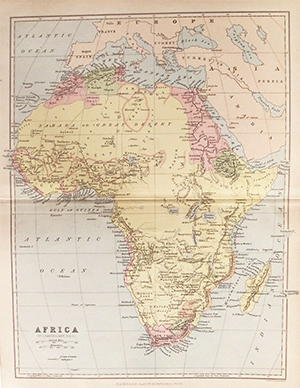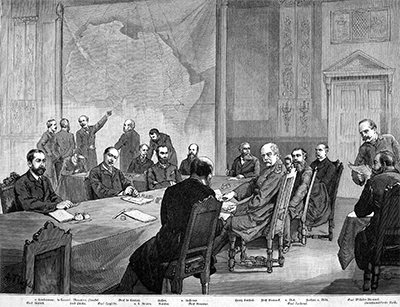The Berlin Conference of 1884–1885
The Berlin Conference was a meeting of European leaders to discuss the varied takeover of large amounts of land in Africa. The series of meetings was the beginning of a process that ended three decades later with nearly the entire continent subdivided into European colonies. 
European powers had long exploited other countries for resources. Fierce battles over sovereignty in North America and South America had followed similar struggles over control of the Spice Trade, in the Far East. In the Middle East, too, were conflicting interests with regard to resource pipelines back to Europe. The continent of Africa was the latest setting for such international struggle. Tensions grew, and many officials decided that it was time for a high-level meeting, to discuss territorial claims on the African continent. The newly unified Germany had emerged as the strongest power in Europe, and so it was that empire's chancellor, Otto von Bismarck, who called the meeting, chose the setting, and acted as host. Thus gathered in Berlin in late 1884 representatives of 14 nations:

Bismarck opened the proceedings on Nov. 15, 1884. The number of representatives from each power varied, although most had just one. Germany had four. The officials conducted a series of meetings to discuss conflicting claims as to the colonization of Africa. The conference ended on Feb. 26, 1885, at which time all countries agreed to the Berlin Act. One thing that all attendees agreed on was that slavery in Africa needed to end once and for all. Various European countries had abolished slavery throughout the 19th Century, but African and Islamic states still allowed it. Another thing agreed on by all was the principle of effective occupation, the idea that a power that wanted to govern a part of Africa as a colony would have to do so in more than name only, setting up or bolstering an existing government, offering means of police and defense, and other things that that European power would do within its borders in order to protect its interests. 
Occurring very quickly after the end of the conference was the establishment of the Congo Free State, under the guidance of Belgium and its king, Leopold II. It had been that monarch's claims to the rich, strategically placed country and its river basin that had spurred many discussions and disagreements. As a result of the conference, Leopold got his territory but agreed that all signatories could have free trade throughout the large Congo River Basin. This included the Congo River itself and the Niger River. The Berlin Conference also resolved some other competing claims involving France, Germany, Italy, Portugal, and the U.K. As a result, with a decade, the majority of the African continent could be claimed as colonies of European powers. |
|
Social Studies for Kids
copyright 2002–2026
David White




